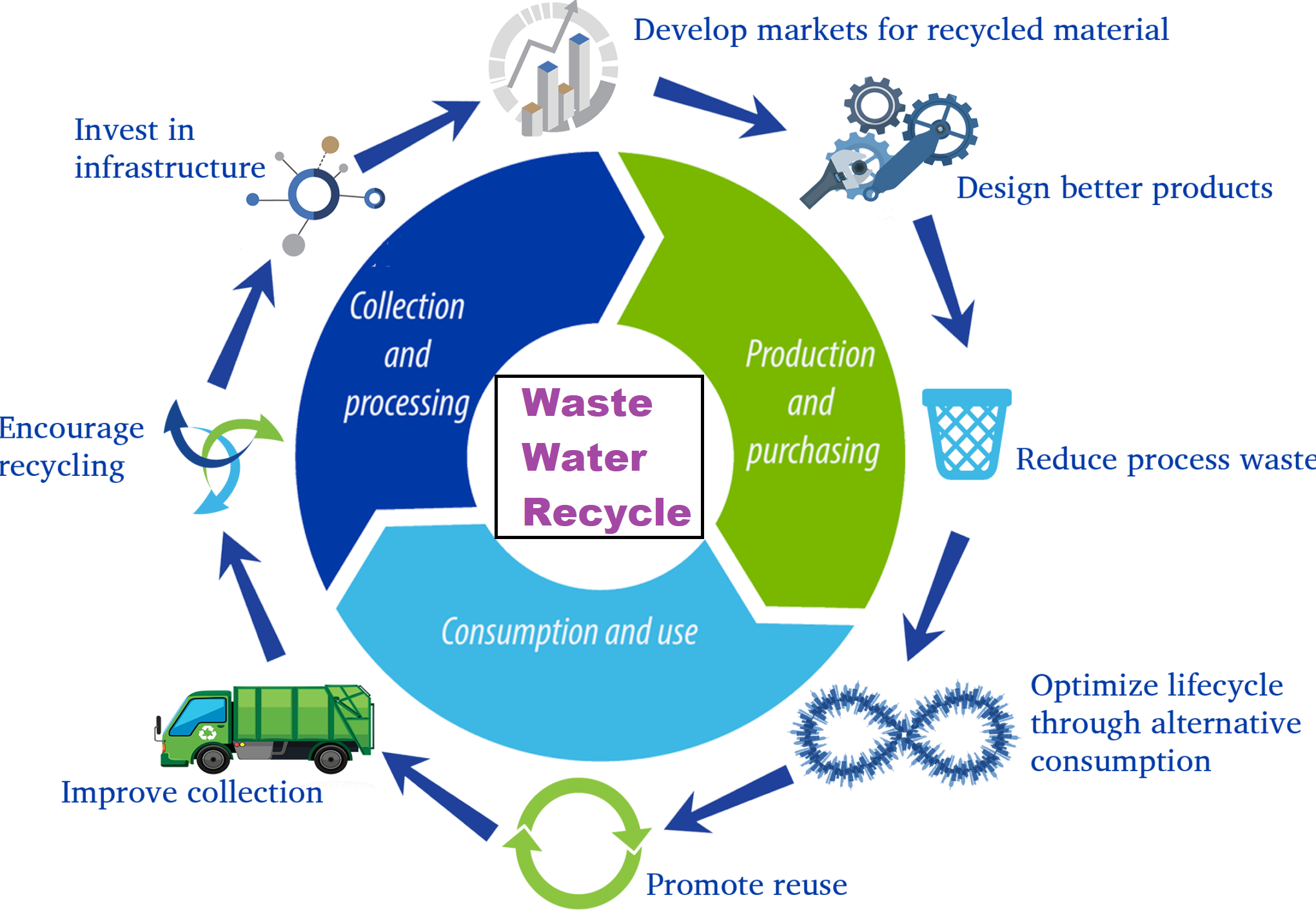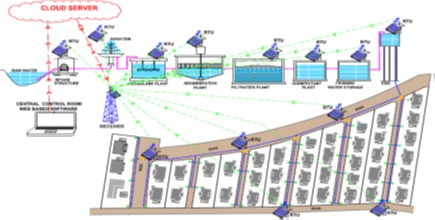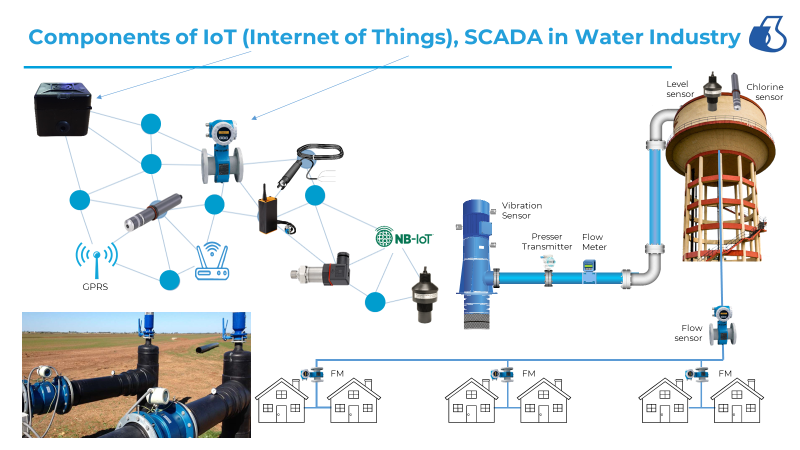By Dr. Mayur J. Kapadia, former Additional General Manager & Head, Quality Control Division, GNFC Ltd., Bharuch, Gujarat.
Water – the sole lifeline of people and a precious gift of nature –is becoming increasingly scarce. In the face of climate change, our freshwater resources are at threat. One tenth of the world’s population lacks access to clean and safe water. The population growth, increased human activities and degradation of natural environments have put challenge to provision of safe and sufficient water to the mankind.
Wastewater is often seen as a burden to be disposed of. However, a major part of the solution to challenge of fresh water availability lies in managing the wastewater. Therefore, the days of considering the waste water a ‘waste’ have gone away because Water is too precious to be used just once.
Rather than considering the wastewaters a burden, it is now viewed as a source of water, energy and nutrients. Wastewater contains many resources like organic matter, phosphorus, nitrogen, heavy metals, thermal energy, etc. Waste water is, thus, a resource with economic value, not a liability anymore. With water demand growing in every sector from agriculture to industry, it is judicious to use wastewater after proper treatment to tide over water crisis and generate huge environmental and economic benefits for mankind.
Water Reuse (also commonly known as ‘water recycling’ or ‘water reclamation’) reclaims water from a variety of sources, then treats and finally reuses it for beneficial purposes such as agriculture and irrigation, potable water supplies, groundwater replenishment, industrial processes, and environmental restoration. Water reuse can provide alternatives to existing water supplies and be used to enhance water security, sustainability, and resilience.
Waste water sources :
• Municipal wastewater
• Industry process water
• Cooling water blow-down
• Boiler bleed-off
• Industrial effluent
• Stormwater
• Agriculture runoff and return flows
• Water resulting from natural resource extraction activities
These sources of water should be adequately treated to meet “fit-for-purpose specifications” for a particular next use i.e., quality needed to ensure public health, environmental protection, and / or specific user needs.
Why Waste Water should not be wasted ?
• Aversion of water scarcity – Salt water (sea water) is plentiful, but fresh water is scarce. Recycling of wastewater, through scientifically advanced resource recovery systems, can put clean water back into circulation, thereby reducing scarcity.
• Fertilizer – It is also possible to convert biosolids into safe, pathogen-free, nutrient-rich, Class A quality chemical and biological fertilizers.
• Green spaces – Wastewater resources can be used for creating public parks, where residents can enjoy rare, green space. The water and nutrients stay in the city, providing new benefits in their recycled form.
• Energy – Advanced technical treatment of waste water can increase the production of biogas in digesters at wastewater treatment plants. Proper waste water treatment can, thereby, become a source of alternative energy.
• Diversion of waste – When treated as “waste”, wastewater biosolids are too often dumped in landfills. Landfill takes up valuable space and sends greenhouse gases into the atmosphere. Sound and advanced treatment can recycle the waste for higher and better uses, reducing the need to create more landfills.
• Soil fertility – Recycled wastewater contains valuable nutrients and organic matter which can keep soil healthy and enhance fertility.
• Prevention ofsoil erosion–Use of nutrient rich waste water can lead to healthy plants and soils, which are able to retain more moisture, thereby reducing the soil degradation and erosion.
• Value addition – There are wastewater management solutions available today that offer production of valuable products with real market value.
• Aquifer recharge – Treated waste water can enhance recharge of artificial lands and aquifers.
• Lowering fresh water cost – The reduction in consumption of fresh water can eventually lead to lowering down of cost towards fresh water consumption treatment.
• Fewer transboundary conflicts – The conflict and war for surface water among districts, states and countries could substantially reduce as dependence on fresh water will come down by waste water recycling.
Shifting of WASTE to RESOURCE :
Water reuse can be done in 2 ways – PLANNED or UNPLANNED.
Planned water reuse : Systems designed with the goal of beneficially reusing a recycled water supply. Examples of planned reuse include agricultural and landscape irrigation, industrial process water, potable water supplies, and groundwater management.
Unplanned water reuse : Situations in which a source of water is substantially composed of previously-used water. The drawl of drinking water by communities from rivers, which receive treated wastewater discharges from communities upstream, is an example of unplanned water reuse.
Depending upon the type of contamination in waste water and “fit-for-purpose specifications” for treated water, the waste water reclamation can be accomplished by employing unit operations like clarification, removal of chemical contaminants, activated sludge process, chlorine dioxide treatment, direct membrane filtration, ultrafiltration, reverse osmosis, and ozone disinfection.
Adequately and properly treated waste water can find use in below listed main areas:
• Irrigation for agriculture
• Landscaping such as parks, rights-of-ways, and golf courses
• Municipal water supply
• Industrial process water requirements
• Toilet flushing
• Dust control
• Surface cleaning of roads
• Concrete mixing and other construction processes
• Recharging of lakes, aquifers
• Environmental restoration
• Fire fighting
Chennai, India has become more circular and resilient towards water reclamation responding to the need for more water amid rapid industrial and population growth. It mandated rainwater harvesting and became the first city in India to reuse 10% of collected wastewater, with plans to achieve a reuse rate of 75%. As part of this effort, its Water Supply and Sewerage Board sells treated wastewater to industrial users. It had been the only utility in India with two large-scale desalination plants that considered to sell most of the biosolids created by the process as manure for agricultural land.
Panipat refinery and petrochemical complex of the Indian Oil Corporation has also complied with a zero liquid discharge requirement.
Gujarat has drafted a Policy for Reuse of Treated Waste Water which aims for full reuse of treated wastewater by 2030.The key objectives of policy include (i) minimum 80% coverage and collection of sewage in all municipal towns, (ii) attain a level of 100% treatment of collected sewage, (iii) reuse at least 25% of fresh-water consumption from treated waste water within prescribed time limit, (iv) reuse 70% & 100% treated waste water by 2025& 2030 respectively.
Above cited are only a few cases. In fact, the reuse of treated waste water has been adopted by many municipal plants, industries and governments.
Risks Associated with Waste Water Recycling
While considering enormous benefits of waste water recycling, the risks associated with it should also be sincerely considered. Proactive actions to mitigate risks will only render water reclamation a healthy proposal for governments, industries and society.
Harm to environment : If not treated and handled properly, reuse of waste water can harm the ecology and environment.
Harm to Public Health : Reuse of sewage could cause harm to public health since pathogens of sewage can lead to spread of disease in community, if adequate disinfection of sewage is not ensured.
Accumulation of pollutants in soil and crops : Use of treated waste water for irrigation pose a threat about accumulation of metal pollutants in farms and the crop.
Ground water contamination : Reclamation of wastes for irrigation and recharge of wells could lead to contamination of ground water streams.
Suitability of waste for the soil, season and crop : While waste water reclamation for irrigation is quite overwhelming, it is necessary to understand the season, type of crop grown and soil characteristics prior to implement water reuse in soil under question.
Monitoring : Thorough and regular monitoring of waste water recycling program bears a high thrust, since minor skip from monitoring could lead to heavy cost.
Way Forward
The waste water reclamation is, of course, gaining due recognition and being increasingly practiced.For further progress in the matter, the following points need to be taken into consideration :
Waste water being affordable and sustainable source of water, energy, nutrients and other recoverable materials, theGovernments need to exploit the enormous opportunities in wastewater.
There are many treatment processes and operational systems that use wastewater in municipal activities, sustainable agriculture, energy production and industrial development.Correct treatment process should be deployed and research should be provided a boost to lead to more cost economical treatment.
Benefits far outweigh the costs of better wastewater management. The positive impacts on water quality and supply by increasing wastewater recycling and safe reuse will drive progress in environmental sustainability and economic development.
Wastewater can be vital for farmers. Wastewater is a valuable source of both water and nutrient content for crops, contributing to water and food security and livelihood improvements.
Wastewater can be used in ‘industrial symbioses’. Industry is a major water consumer and wastewater discharger. Many businesses are now using some of their ‘process water’ for cooling or heating, and using rainwater for toilet flushing, irrigation or vehicle washing.
Conclusion
Victor Hugo, A French Novelist, in his acclaimed novel Les Misérables, referred to the sewage system as “the conscience of the city,” – a place where secrets don’t exist. After some 200 years later today, the researchers have used innovative technologies, scientists have deployed various analytical techniques and artificial intelligence have employed varied technological tools to study the contents of our waste waters to disclose all of their secrets. Due to unfurling of all the secrets and characteristics, it has become possible to treat the waste waters to make them 100 % safe for the “fit-for-purpose” specifications. In view of limited availability of fresh water, increasing water requirements and promise that waste waters hold for recycling, it is time to make full use of waste waters for domestic and industrial use. Waste water, therefore, has not remained a ‘waste’, but acclaimed state of a useful ‘resource’.





